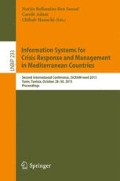Abstract
Serious Games (SG) are more and more used for training in various domains, but notably in crisis management. In order to improve training results, learner assessment can provide insights on what went right or wrong during a training session. Such assessment is more complex when actors’ individual actions must be considered, but also the results of their interactions (collective actions). Such interactions can either be engaged with real or simulated players, through adaptive dialogues immersing players in the different ways (actions, procedures, …) to manage a crisis. This paper presents a multi-agent simulation and assessment approach of SG players, targeting the management of distributed and heterogeneous information (in nature or source) based on the concept of Evaluation Space allowing the production of individual and collective assessments. This approach is developed and illustrated on the SIMFOR SG dedicated to crisis management.
Access this chapter
Tax calculation will be finalised at checkout
Purchases are for personal use only
References
Nieborg, D.: America’s Army: More than a game. Transforming Knowledge into Action through Gaming and Simulation, SAGSAGA (2004)
Mathieu, P., Panzoli, D., Picault, S.: Virtual customers in a multiagent training application. In: Pan, Z., Cheok, A.D., Müller, W., Liarokapis, F. (eds.) Transactions on Edutainment IX. LNCS, vol. 7544, pp. 97–114. Springer, Heidelberg (2013)
Haferkamp, N., Kraemer, N.C., Linehan, C., Schembri, M.: Training disaster communication by means of serious games in virtual environments. Entertainment Comput. 2, 81–88 (2011)
Amokrane, K., Lourdeaux, D., Burkhardt, J.M.: Hera: learner tracking in a virtual environment. IJVR 7(3), 23–30 (2008)
Di Loreto, I., Divitini, M.: Games for learning cooperation at work: the case of crisis preparedness. In: ECTEL-meets-ECSCW, pp. 20–24 (2013)
Buche, C., Querrec, R., De Loor, P., Chevaillier, P.: Mascaret: pedagogical multi-agents systems for virtual environment for training. In: International Conference on Cyberworlds, pp. 423–430 (2003)
Wendel V., Gutjahr, M., Göbel S., Steinmetz, R.: Designing collaborative multiplayer serious games for collaborative learning. In: Proceedings of the CSEDU (2012)
GALA Consortium: Learning Analytics for SGs, Deliverable 2.4. Technical report (2014)
Thomas, P., Labat, J.-M., Muratet, M., Yessad, A.: How to evaluate competencies in game-based learning systems automatically? In: Cerri, S.A., Clancey, W.J., Papadourakis, G., Panourgia, K. (eds.) ITS 2012. LNCS, vol. 7315, pp. 168–173. Springer, Heidelberg (2012)
van Ruijven, T., Mayer, I., de Bruijne, M.: Multidisciplinary coordination of on scene command teams in virtual emergency exercises. IJCIP 9, 13–23 (2015). Elsevier
De Freitas S., Jarvis S.: A framework for developing serious games to meet learner needs. In: The Interservice/Industry Training, Simulation & Education Conference. NTSA (2006)
Yusoff, A., Crowder, R., Gilbert, L., Wills, G.: A conceptual framework for serious games. In: 9th Conference on Advanced Learning Technologies, ICALT 2009. IEEE (2009)
Raybourn, E.-M.: Adaptive thinking and leadership training for cultural awareness and communication competence. Interact. Technol. Smart Educ. 2(2), 131–134 (2005)
Stahl, G., Koschmann, T., Suthers, D.: Computer-supported collaborative learning: An historical perspective. In: Sawyer, R.K. (ed.) Cambridge Handbook of the Learning Sciences. Cambridge University Press, Cambridge (2006)
Oliveira, V., Coelhoa, A., Guimarães, R., Rebelo, C.: Serious game in security: a solution for security trainees. In: VS-GAMES 2012 (2012)
Burns, H., Capps, C.: Foundations of intelligent tutoring systems : an introduction. In: Polson, M.C., Richardson, J.J. (eds.) Foundations of intelligent tutoring systems, pp. 1–18. Lawrence Erlbaum Associates, Hillsdale (1989)
Lourdeaux, D., Burkhardt, J.M., Bernard, F., Fuchs, P.: Relevance of an intelligent agent for virtual reality training. Int. J. Continuous Eng. Life-long Learn. 12(1/2/3/4), 131–143 (2002)
Chang, P.H.-M., Chen, K.-T., Chien, Y.-H., Kao, E.C.-C., Soo, V.-W.: From reality to mind: a cognitive middle layer of environment concepts for believable agents. In: Weyns, D., Van Dyke Parunak, H., Michel, F. (eds.) E4MAS 2004. LNCS (LNAI), vol. 3374, pp. 57–73. Springer, Heidelberg (2005)
Rao, A., Georgeff, M.-P.: BDI agents: from theory to practice. In: ICMAS 1995 (1995)
Oulhaci, A., Tranvouez, E., Fournier, S., Espinasse, B.: A multi-agent system for learner assessment in serious games: application to learning processes in crisis management. In: Seventh IEEE International Conference on Research Challenges in Information Science, Paris (2013)
Miller, J.-G.: Living Systems. Mcgraw-Hill, New York (1978)
Kay, J., Maisonneuve, N., Yacef, K., Reimann, P.: The big five and visualisations of team work activity. In: Ikeda, M., Ashley, K.D., Chan, T.-W. (eds.) ITS 2006. LNCS, vol. 4053, pp. 197–206. Springer, Heidelberg (2006)
Baumard, P., Vidal, R.: Fiabiliser la gestion des feux de très grande ampleur - enhancing reliability in large scale willand fire response organization. Ministère de l’écologie, de l’énergie, du développement durable et de la mer. Technical report (2009)
Author information
Authors and Affiliations
Corresponding author
Editor information
Editors and Affiliations
Rights and permissions
Copyright information
© 2015 Springer International Publishing Switzerland
About this paper
Cite this paper
Oulhaci, A., Tranvouez, E., Fournier, S., Espinasse, B. (2015). Improving Players’ Assessment in Crisis Management Serious Games: The SIMFOR Project. In: Bellamine Ben Saoud, N., Adam, C., Hanachi, C. (eds) Information Systems for Crisis Response and Management in Mediterranean Countries. ISCRAM-med 2015. Lecture Notes in Business Information Processing, vol 233. Springer, Cham. https://doi.org/10.1007/978-3-319-24399-3_8
Download citation
DOI: https://doi.org/10.1007/978-3-319-24399-3_8
Published:
Publisher Name: Springer, Cham
Print ISBN: 978-3-319-24398-6
Online ISBN: 978-3-319-24399-3
eBook Packages: Computer ScienceComputer Science (R0)

